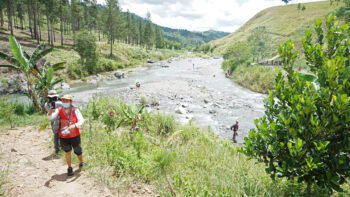MALAYBALAY CITY (October 9) — This month marks the 13th anniversary of the Indigenous Peoples’ Rights Act (Republic Act 8371). But there’s no reason for the country’s indigenous peoples to celebrate; corporate greed abetted by complicity on the part of the National Commission on Indigenous Peoples (NCIP), other agencies, and opportunistic IP leaders as well as the unwillingness of the Supreme Court to give the law a firm standing by interpreting it in favor of the concept of genuine self-determination.
IPRA is basically an ancestral domain law that seeks to correct a historical injustice: the massive act of land-grabbing against the IPs (called Lumads in Mindanao) first, by the colonizers and subsequently, through the policies and programs imposed by the post-War governments. Ancestral territories were opened up to logging, mining, plantations and other economic ventures on the premise that these lands belong to the public domain and hence the government may dispose of such lands and the resources therein as it wished, or what is known in legal parlance as the Regalian Doctrine.
On the other hand, IPRA rests on the theory of native title, a theory derived from the case of Carino v. Insular Government in which the US Supreme Court ruled that lands that never fell under Spanish colonial control were never part of public lands and should be presumed as not part of the territory that Spain ceded to the US under the Treaty of Paris. If such was the case, then the same lands were not entrusted to the Philippine state [by the US] when the archipelago regained its independence after World War II.
The Carino Doctrine states: “Every presumption is and ought to be against the Government in a case like the present. It might, perhaps, be proper and sufficient to say that when, as far back as testimony or memory goes, the land has been held by individuals under a claim of private ownership, it will be presumed to have been held in the same way from before the Spanish conquest, and never to have been public land.”
Section 3(l) of IPRA defines native title as “pre-conquest rights to lands and domains which, as far back as memory reaches, have been held under a claim of private ownership by ICCs/IPs, have never been public lands and are thus indisputably presumed to have been held that way since before the Spanish Conquest.”
But since the Regalian Doctrine is entrenched in the 1987 Constitution, the advocates of IPRA had to legitimize the theory of native title by sustaining the discourse of IP rights. In doing so, they had to demolish certain concepts of sovereignty and prove that ancestral lands did not come from the state but have had always been communally held private lands since time immemorial and utilized according to the dictates of culture.
To a rent-seeking state, the implications of yielding to the arguments of native title are enormous. It would mean some 30 percent of Philippine territory becoming ancestral lands. More important, these lands contain forests, wildlife, minerals and other resources that are not found elsewhere. Therefore, the real threat posed by IPRA is the prospect of the state losing effective control and ownership over these resources. Such a scenario would imperil large commercial interests over the resource-rich ancestral domains.
Congress made safeguards against this possibility by inserting a provision (Section 56) in IPRA which states: “Property rights within the ancestral domains already existing and/or vested upon its effectivity shall be recognized and respected.” Whatever exemptions are granted under Section 56 are ingrained in the definitions of ancestral domains (Section 3[a]) and ancestral lands (Section 3[b]).
Property rights in this sense appear to be loosely defined and questions did arise if these should be interpreted to include not just rights to land ownership but also existing corporate ventures.
On 13 October 1998, the NCIP responded to the issue by coming out with Administrative Order No. 3 exempting all leases, licenses, contracts and other forms of concessions within ancestral domains prior to the effectivity of NCIP AO No. 1 (IPRA’s Implementing Rules and Regulations), from the coverage of IPRA’s provisions on free and prior informed consent. AO No. 3 greatly benefited mining firms in particular, a move that drew widespread criticisms from anti-mining groups and the IPs themselves. It was NCIP’s first overt act of betrayal against the IPs. (Next: Implications of the Supreme Court decision on the petition against Ipra)







